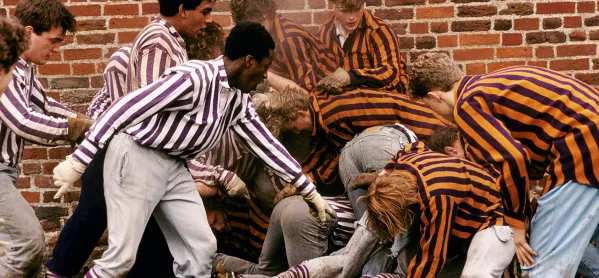‘Greening’s comments about Eton show how misunderstood our independent schools are’
Share
‘Greening’s comments about Eton show how misunderstood our independent schools are’
Justine Greening has joined a growing list of former Conservative secretaries of state who seem to have a grudge against independent schools. Greening is reported to have said that employers should offer a job opportunity to a candidate from an under-performing school before an Old Etonian with the same grades.
For Greening, in order to boost social mobility, employers should use something called “contextual recruitment” before they make an appointment. This rather Orwellian-sounding process should be done in the name of that holy grail for all governments, irrespective of political hue: social mobility. Greening, who went to a comprehensive herself, claims that a student from a poor school with three grade Bs is likely to be “more impressive” than a student who went to David Cameron’s alma mater.
Well, they could be and if they are then they should be offered the job, but then again, given the variety of human types and the variability of social context, things might not be as straightforward as that. Should we be defined by our backgrounds, and by choices we had no control over? Should prospective employers be fined for not exercising this positive discrimination?
Who knows. Anyway, and predictably, the Guardian approved (and even more predictably Toby Young didn’t) and Gaby Hinsliff, trying to sound even-handed and alert to what her readers want to hear, tepidly stated that although “context isn’t everything in life...it isn’t nothing either”. She’s probably written sharper insights. And she was careful to stress that her particular animus is against public-school boys rather than girls, further underlining the case that if there is one socioeconomic group it is entirely acceptable to dislike in public it is posh boys from public schools. It’s practically de rigueur on Twitter. After all, Eton is code for a certain type: the Johnsons and Camerons of the world, the people who brought us Brexit, the personification of a certain sort of privilege. You won’t find many people in public life defending them or their ilk now. The Tories want to distance themselves from anything that whiffs of elitism, and even the Labour Party, still keeping up the tradition of employing a fair number of lefty toffs regardless of their A-level grades, are keeping quiet, hoping that an issue which they have struggled with ever since Crossman goes away.
But, of course, it won’t. And MPs will keep coming back to our divided school system because they think there are easy votes, and even easier headlines, to gain. And every time they do so the debate becomes a little more coarse, a little less nuanced. Nobody benefits from this. Independent schools are not, typically, Eton-like. They educate young people from a huge range of backgrounds, and with very diverse needs.
Who would know, if you simply looked at the school that a pupil went to, whether he or she had struggled with special educational needs and disability (15 per cent of all pupils in fee-paying schools are diagnosed with special needs)? Some 33 per cent are from minority ethnic backgrounds, which is slightly above state-funded schools; but are the challenges they have faced negated because they may (or may not) have come from more affluent backgrounds than their neighbours? And 33 per cent of all pupils attending an independent school receive help with their fees, and some of these schools are investing significant sums of money to push this number even higher, with Eton, which want to be fully needs-blind in the future, leading the way on this.
State and private school partnerships
Greening’s argument chooses to ignore the 1,137 partnerships that now exist between state and private schools, sharing everything from academic expertise to sport, drama and music facilities. Those independent schools - such as Westminster and Wellington - which sponsor academies also share teachers, as well as classrooms. The divide that is seen to exist in certain parts of the media, as well as in cross-party gatherings in Westminster, is simply no longer recognised by thousands of students, their families, and the schools they attend. These partnerships are mutually rewarding, benefiting all, with independent schools pooling ideas with their colleagues in the state sector.
Independent schools have long become accustomed to being the whipping boys (or girls) of various politicians who seek to promulgate outdated ideas about social hierarchies for reasons of political expediency.
For every Eton, or Harrow, there are many small, fee-paying schools populated with hard-working teachers doing their very best for their students. And many of those schools serve parents who are making considerable sacrifices to send their children to study there. In this sector, fees can vary from under £2,000 per term to over £11,000. To simply represent the sector through the prism of one high-profile school is to reduce a complex, and very human, set of stories to a single, self-serving narrative.
Until we move beyond this peculiarly British, and rather sclerotic relationship with class and education, and see the real picture, our schools, in both sectors, will continue to be misrepresented and misunderstood. All our children, regardless of backgrounds, deserve better than that.
David James is deputy head (academic) at Bryanston School in Dorset and tweets at @drdavidajames




